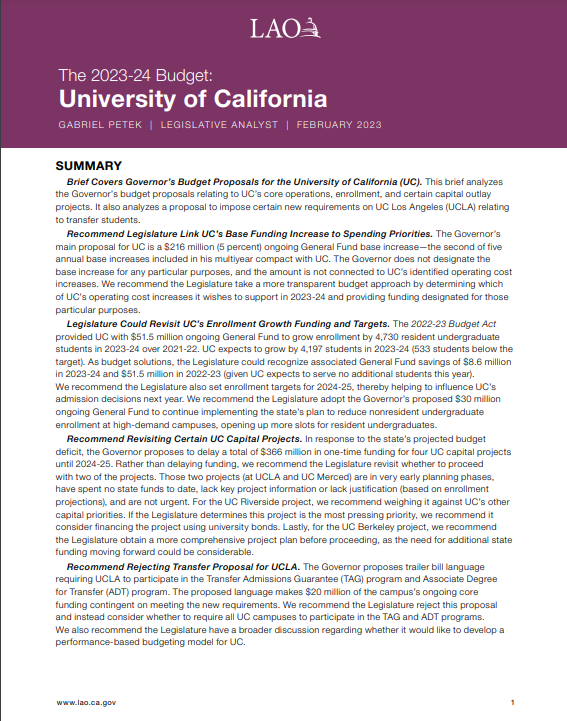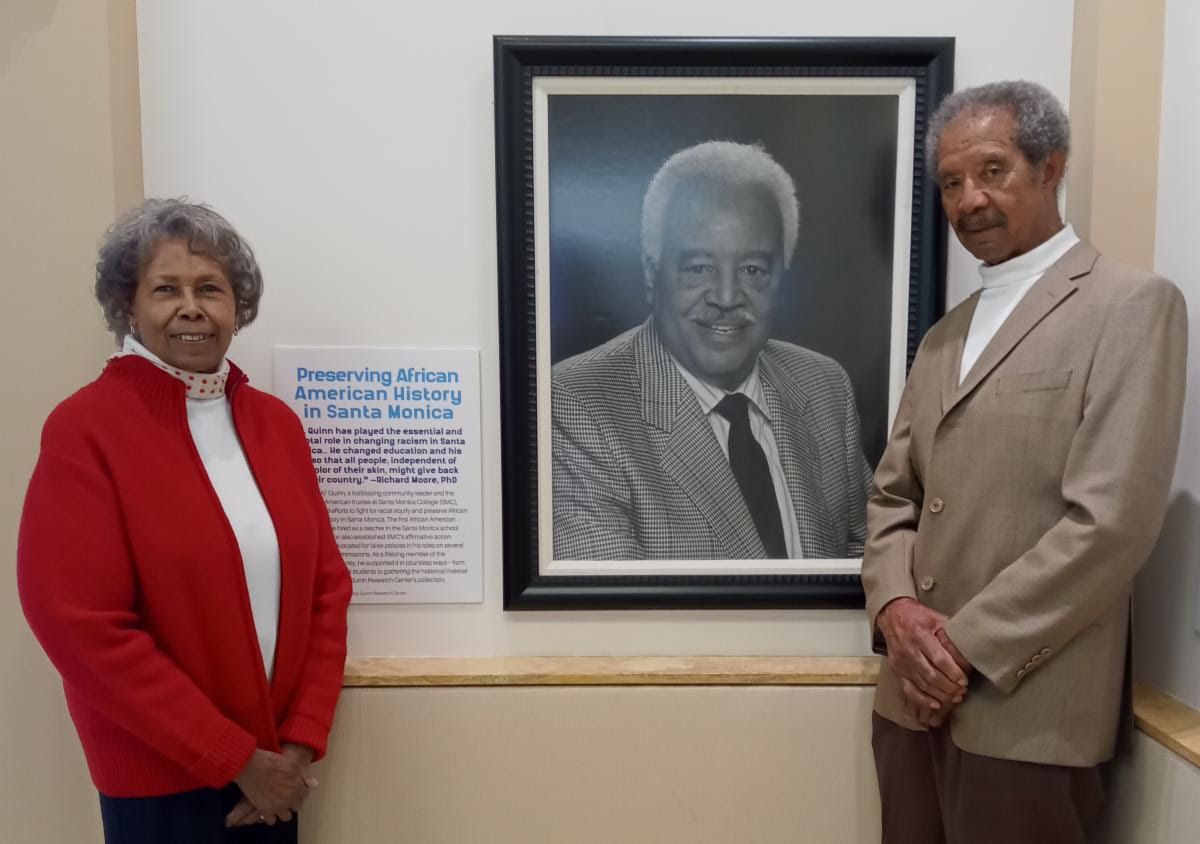The Legislative Analyst's Office (LAO) has reviewed the proposed 2023-24 budget allocation for UC in the governor's January proposal. It's important to note that the LAO will always lean toward the legislature having more control since it is ultimately a creature and creation of the legislature. You won't find a lot of respect for UC's constitutional autonomy in LAO documents as a result.
However, in the case of the governor's strange budget proposal to single out UCLA among the campuses to rearrange its transfer policy, even the LAO is unhappy. We reproduce first the LAO's statement in the initial summary and then the more detailed statement in the report:
Recommend Rejecting Transfer Proposal for UCLA.
The Governor proposes trailer bill language requiring UCLA to participate in the Transfer Admissions Guarantee (TAG) program and Associate Degree for Transfer (ADT) program. The proposed language makes $20 million of the campus’s ongoing core funding contingent on meeting the new requirements. We recommend the Legislature reject this proposal and instead consider whether to require all UC campuses to participate in the TAG and ADT programs. We also recommend the Legislature have a broader discussion regarding whether it would like to develop a performance-based budgeting model for UC...
===
Governor Proposes to Require UCLA to Participate in Certain Transfer Programs.
The administration proposes to place certain new requirements on the UCLA campus with the goal of facilitating community college students’ ability to transfer to the campus. Specifically, by 2025-26, the campus would need to (1) enact and maintain policies to participate in the TAG program as well as (2) create and maintain pathways for students transferring with an ADT. By March 31, 2024, the campus would need to submit a report to the Director of Finance indicating its commitment to meeting these requirements.
Governor Links Requirement With Campus’s Base Funding. The Governor does not provide a General Fund augmentation to UC for meeting the new transfer requirements at the Los Angeles campus, but he proposes trailer bill language making $20 million of that campus’s ongoing core funding contingent on it meeting the new requirements. Based upon the UC Office of the President’s determination, if the campus does not meet the new requirements, UC is to redirect the $20 million to the other nine UC campuses using its regular campus allocation model.
Assessment
UCLA Does Relatively Well on Enrolling and Graduating Transfer Students. In 2022-23, UCLA expects to enroll approximately 3,300 new transfer students—more than any other UC campus. (UC San Diego expects to enroll the next largest group of new transfer students, approximately 2,700.) Even more importantly, UCLA has the lowest ratio of freshmen to transfer students. The UCLA ratio is 1.53—much better than the systemwide target rate of two freshmen to one transfer student, as well as notably lower than any other campus. (UC Davis has the next best ratio, 1.90.)
Furthermore, transfer students at UCLA graduate at higher rates than the system overall. At UCLA, 74 percent of transfer students graduate within two years, increasing to 91 percent graduating within three years—compared to 63 percent and 85 percent, respectively, systemwide.
No Compelling Justification for Singling Out UCLA.
UCLA is one of four campuses (together with Davis, Irvine, and San Diego) that already meets the compact goal of having a freshman-to-transfer ratio of 2.0 or below. Together with its relatively good transfer and graduation rates, the campus does not show evidence of requiring special rules to promote better transfer access or outcomes. Moreover, UCLA is not anomalous in its participation in transfer programs.
Two other UC campuses do not participate in the TAG program, and no UC campus currently participates in the ADT program. UC Transfer Pathways, for which all nine UC general campuses participate, effectively are UC’s alternatives to CSU’s ADT pathways.
Governor’s Approach Sets Very Poor Policy Precedence.
The Governor proposes linking base funding to a very narrow set of outcomes at a single campus. Such an approach is particularly myopic. It also is of questionable design in terms of promoting appropriate incentives.
The Governor’s approach focuses solely on inputs (participating in certain transfer programs) rather than outcomes, which is counter to the basic notion of performance-based budgeting. Moreover, the Governor’s approach violates the basic tenet of fairness in that it potentially punishes a single campus for not doing certain things, while other campuses acting in the same ways would experience no state repercussions.
Recommendation
Recommend Rejecting Proposal and Considering More Holistic Approach. For all the reasons discussed above, we recommend the Legislature reject this proposal. We recommend the Legislature consider whether it would like to require all UC campuses to participate in the TAG and ADT programs. If the Legislature is interested in pursuing these new requirements, we encourage it to coordinate with UC on how best to navigate the associated transitions. In the case of both the TAG and ADT programs, affected UC campuses would need to make important changes to their admission requirements. We also recommend the Legislature have a broader conversation regarding whether it would like to develop a performance-based budgeting model for UC.
If the Legislature is interested in linking funding to performance, we recommend it focus on a set of key expectations and apply the model to all UC campuses. As with the funding model the state uses for CCC, the Legislature could consider having both access and outcome components embedded in the model, along with further incentives to serve underrepresented students.
Full publication at https://lao.ca.gov/reports/2023/4684/UC-Budget-021523.pdf.
An interesting question is where the UCLA proposal came from. I think Regent Cohen, who was at one time head of the Dept. of Finance, let the cat out of the bag. At the January Regents meeting, he spoke out in favor of the general idea.* So, it appears this proposal has been simmering at the Dept. of Finance for some time - perhaps not specifically focused on UCLA - and finally surfaced after he left. The Dept. of Finance is part of the executive branch under the governor, so there is a bit of governor vs. legislature at work here.
===
*http://uclafacultyassociation.blogspot.com/2023/01/watch-third-day-regents-meeting-of.html. See his comments in https://ia804705.us.archive.org/31/items/board-finance-and-capital-strategies-committee-1-19-23/Academic%20and%20Student%20Affairs%20Committee%201-19-23.mp4 at about 2:47.20.





























